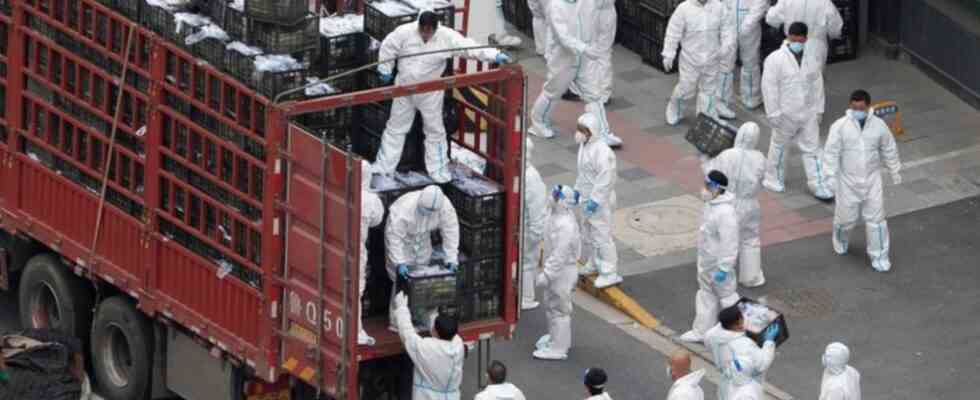corona pandemic
Shanghai as a “ghost town” – continued insecurity for children
A truck with groceries is unloaded. Photo: -/CHINATOPIX/AP/dpa
© dpa-infocom GmbH
Despite zero Covid policy, Omicron is spreading rapidly in China. All infected people are quarantined. After protests, parents should be allowed to accompany their children – the circumstances are unclear.
In the worst corona wave in China since the pandemic began two years ago, the number of infections continues to rise rapidly.
The Beijing Health Commission reported a peak of more than 20,000 cases nationwide on Wednesday. Due to the strict zero-Covid policy in China, extensive curfews apply in the metropolises of Shanghai, Changchun and Shenyang in north-east China, which have a total of around 38 million inhabitants.
The practice of separating young children from their parents has sparked widespread outrage, which also worries foreign families living in China. After the protests, the Shanghai municipal government announced that uninfected parents could apply to accompany children there who needed special support into isolation. However, it remained unclear whether the regulation was only limited to children who needed special care.
“Traumatic Experiences”
“There is a lot of uncertainty here,” said the chairwoman of the local association of the EU Chamber of Commerce in China, Bettina Schön-Behanzin. “We clearly demand that minors be able to self-quarantine at home with their parents to ensure their physical and mental well-being.”
In the past few months, there have already been repeated cases of foreign children who have tested positive upon entering the country and who came to the hospital without being able to have their parents with them or without being able to speak the language. “Traumatic experiences” were reported.
Central quarantine camp
In Shanghai, where the curfew was extended indefinitely, authorities tested the 26 million residents again on Wednesday. “Shanghai is in a kind of state of emergency,” said Schön-Behanzin. The metropolis has turned into a “ghost town”: “There is a strong feeling of uncertainty in the city. It’s fueled by a lack of supplies, endless lockdowns, and a really big risk of being sent to one of the central quarantine camps.”
In China, anyone who tests positive is taken to a central quarantine facility. In addition to the exhibition halls in Pudong, which can accommodate 15,000 people, the national exhibition center is now to be converted into a temporary camp for another 40,000 people.
In Shanghai and Changchun in north-east China, where there has been a lockdown for four weeks, production in the Volkswagen Group plants is still at a standstill. The BMW plant in Shenyang, northeast China, where similar restrictions have been in force for two weeks, is also not producing, as reported by the EU Chamber of Commerce.

